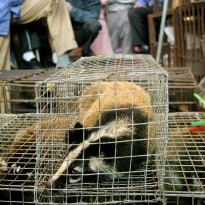The Chinese have long been famous for their cuisine and not always in a positive light. They are known to consume some of the most exotic animals, from porcupines to snakes to turtles, the kind of food you really don't expect on someone's plate. Not only do the Chinese take pride in serving just about anything and everything that exists on the face of the earth, they also happen to relish some of the extensively endangered species due to which most of the Chinese eateries have come under scrutiny from the Chinese authorities.The diners of southern China often boast that they will "eat anything with four legs except a table". Expressing its concern over the rapid pace of extinction of some of the endangered animals, the Chinese authorities had raised the maximum sentence for anyone caught selling or consuming endangered species. The person would now be liable to imprisonment up to 10 years. Despite this, there is still some evidence of laxity in the law enforcement in the province of Guangdong, where meat sellers not only sell some of the most exotic animals but also don't shrink from charging exorbitant amount for their selling."I can sell the meat for 500 yuan ($A86.56) per half kilo," a pangolin vendor at the Xingfu - "happy and rich" - wholesale market in Conghua said.
"If you want a living one it will be more than 1,000 yuan."The market was the subject of a Chinese media expose two years ago, when a local official told the state-run Beijing Technology Times that its role as a centre for animal trafficking was an "open secret".Not all the produce is illegal but a huge sign touted giant salamanders, which are classed as critically endangered - one level below "extinct in the wild" - on the International Union for the Conservation of Nature's Red List of threatened species. Asian yellow pond turtles were up for sale beside porcupines, most likely from Asia where several species are also critically endangered.Southern China has long been the centre of a culinary tradition called "wild flavour", which prizes parts of unusual wild animals including tigers, turtles and snakes as a route to health - despite the lack of orthodox scientific evidence proving such benefits exist."The illegal wildlife trade in general has become a multi-billion dollar business in China," Jill Robertson, CEO of Hong Kong-based charity Animals Asia.Inputs from AFP
"If you want a living one it will be more than 1,000 yuan."The market was the subject of a Chinese media expose two years ago, when a local official told the state-run Beijing Technology Times that its role as a centre for animal trafficking was an "open secret".Not all the produce is illegal but a huge sign touted giant salamanders, which are classed as critically endangered - one level below "extinct in the wild" - on the International Union for the Conservation of Nature's Red List of threatened species. Asian yellow pond turtles were up for sale beside porcupines, most likely from Asia where several species are also critically endangered.Southern China has long been the centre of a culinary tradition called "wild flavour", which prizes parts of unusual wild animals including tigers, turtles and snakes as a route to health - despite the lack of orthodox scientific evidence proving such benefits exist."The illegal wildlife trade in general has become a multi-billion dollar business in China," Jill Robertson, CEO of Hong Kong-based charity Animals Asia.Inputs from AFP
Advertisement










